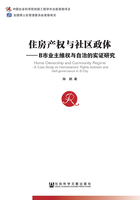
Abstract
Through the lens of politics of housing,this dissertation explores the complex interactions among homeowners’ organization,rights protecting activities and self-governance in commercial neighborhoods during China’s social transition. The housing commoditization reform fundamentally transformed Chinese urban neighborhoods,which were not only changed from traditional administrative planning areas into modern private property territories,but also from the acquaintances based communities to strangers based neighborhoods. This transformation led to the rise of homeowners’ organization,the emergence of grassroots movement,and the birth of self-governance. During this process,movement elites gradually change into self-governance elites,while homeowners’ committees also shift their primary goal from right protecting activities to everyday community management.
Beginning with interests’ infringement,homeowners’ rights protecting activities could finally develop into legislation participation. Contention around the common interests constitutes the core contents for tug of war between the homeowners and the property companies. Homeowners’ rights-based protest aims to regain community sovereignty from property companies. Homeowner’s activism includes three main strategies:resistance with the law,resistance through the law,and resistance for the law,depending on homeowners’ social and legal positions. This lawful contention not only promotes the production of civil knowledge,but also achieves the transformation of governance of the grass-roots government.
A commercial neighborhood has basic two elements:its homeowners and the common property. Consequently,the community regime also has two basic dimensions:homeowners’ decision-making structure,including direct democracy and indirect democracy,and mode of property management,including trust mode and self-management mode,which can establish an ideal typology. We can assess the self-government performance by four dimensions:property service,the increase of the common property,homeowners’ participation and the identity of residence. The size of the community,the system of property management,the characteristics of leadership,factional polarization,institutional provision and the intervention of government are six factors,which influence and shape the community regime’s formation and performance.
Based on the above discussions,the dissertation argues that homeowners’ rights activism demonstrates its potential of building citizenship rights. That is to say by establishing the organization,initiating the rights movement,and achieving self-governance,the homeowner gradually realize from the housing property to the autonomy of property management and then to the citizenship rights. In this regard,this study can be seen as an empirical sociological research for the commoditization of housing reform and social transformation process in China from the micro-community and agent’s level.
Keywords:home ownership;community regime;politics of housing;citizenship